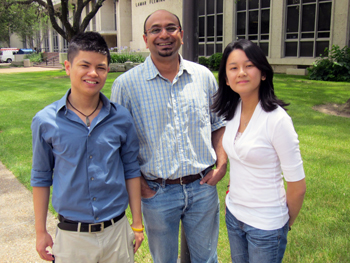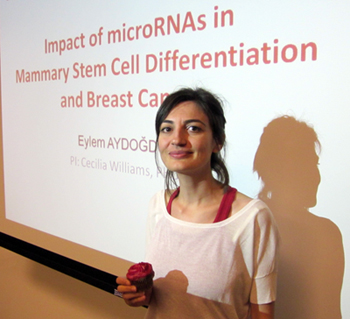Four University of Houston (UH) students are well on their way to emerging cancer
research careers upon achieving significant milestones this spring in their work toward
new therapies for prostate and breast cancer.
All studying at the UH Center for Nuclear Receptors and Cell Signaling (CNRCS), these
students are examining what allows a person’s DNA to be read and expressed, which
is vital in developing treatments for cancer. Established in 2009, the CNRCS is one
of the focal points of the UH Health initiative, with its researchers involved in
examining the many functions and behaviors of nuclear receptors, a class of proteins
that regulate genes in response to hormones. 
“We emphasize hands-on student participation at the center and provide training opportunities
for select graduate and undergraduate students,” said Frigo, who supervised all three
award recipients. “These awards recognize the drive of these students and are significant
accomplishments in their emerging cancer research careers.”
Graduate student Jayantha Tennakoon, whose work focuses on examining how the class
of steroid hormones called androgens promote prostate cancer, received an Outstanding
Abstract Award for ENDO 2012, the upcoming 94th Annual Meeting and Expo of The Endocrine
Society, which will be held this summer in Houston. He’s most interested in how androgen,
which controls the development and maintenance of masculine characteristics, fuels
the spread and growth of cancer cells. By examining the cell signaling pathways, Tennakoon
hopes to identify the specific molecules that provoke the cancer cells.
Undergraduate students Hannah Do and Peter Tran also will be working full time through
the summer, with each being selected for a Summer Undergraduate Research Fellowship
(SURF) awarded by the UH Office of Undergraduate Research. Do will be maintaining
a drug library of novel molecules and then determine the role and effects of these
molecules in contributing to the initiation and development of prostate cancer. Her
goal is to isolate new therapeutic targets for treating advanced prostate cancer.
The scale of her project is unique for the undergraduate level and will incorporate
resources provided by the pharmaceutical companies GlaxoSmithKline and Roche.
Tran will be testing whether a specially modified version of a protein promotes the
development of aggressive life-threatening prostate cancers. The project will be an
extension of his current lab work and will set the foundation for potential future studies
aimed at therapeutically targeting this unique protein variation. Tran’s studies will
be the first performed with the center’s new advanced imaging system for in-depth
monitoring of tumor growth and cancer progression, awarded by the Cancer Prevention
and Research Institute of Texas. 
Following the successful defense of her dissertation, Aydogdu learned that her paper
would be published in the journal Carcinogenesis, a monthly multi-disciplinary journal
focused on genetics and exploring cancer-causing agents. The paper details the pivotal
roles of microRNAs in stem cell biology and the creation of cancer, which is especially
relevant to breast cancer therapeutics. With the help of her lab group and fellow
researchers, Aydogdu was able to identify a set of microRNAs that represent possible
drug targets for breast cancer treatment.
“Eylem is a truly skilled researcher in the emerging field of microRNAs in breast
cancer,” says Cecilia Williams, assistant professor and supervisor to Aydogdu. “She
will be missed but we are proud to confer the first of many Ph.D.s trained at the
center.”
Led by world-renowned nuclear receptors researcher Dr. Jan-Åke Gustafsson, the CNRCS
provides students hands-on training with researchers who are working on finding new
treatments for an array of significant diseases, combining interdisciplinary study
and collaboration with the Texas Medical Center and industry partners.
###
About the University of Houston
The University of Houston is a Carnegie-designated Tier One public research university
recognized by The Princeton Review as one of the nation’s best colleges for undergraduate
education. UH serves the globally competitive Houston and Gulf Coast Region by providing
world-class faculty, experiential learning and strategic industry partnerships. Located
in the nation’s fourth-largest city, UH serves more than 39,500 students in the most
ethnically and culturally diverse region in the country. For more information about
UH, visit http://www.uh.edu/news-events/.
To receive UH science news via e-mail, sign up for UH-SciNews.
For additional news alerts about UH, follow us on Facebook and Twitter.